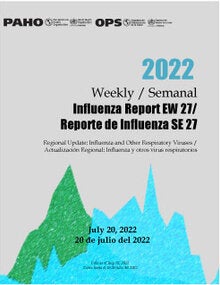North America: Overall, influenza activity decreased in the subregion while SARS-CoV-2 continued to rise. In Mexico, influenza activity with A(H3N2) virus predominance decreased, while SARS-CoV-2 positivity continued to increase. ILI activity remained at moderate-intensity levels, whereas SARI activity rose to high-intensity levels, in both cases driven by the SARS-CoV-2 circulation. In the United States, influenza activity was low, with influenza A(H3N2) viruses predominating. In addition, RSV activity remained stable compared to previous weeks, while SARS-CoV-2 activity increased with higher COVID-19-associated hospitalizations.
Caribbean: Influenza activity remained very low, with the predominance of the influenza A(H3N2) virus. Belize, the Dominican Republic, Haiti, Jamaica, and Saint Lucia, reported increased SARS-CoV-2 activity, with increased SARI cases, although below the epidemic thresholds, except in Haiti, with levels above average for this time of year. In the Dominican Republic, RSV activity remained elevated at levels seen in the pre-pandemic period, although decreasing.
Central America: Influenza activity continued to decrease in the subregion, and the influenza A(H3N2) virus predominated. In El Salvador and Nicaragua, influenza activity decreased to moderate-intensity levels, with the A(H3N2) virus predominance. SARS-CoV-2 activity rose across the subregion, with increased levels in El Salvador and Panama. Influenza and SARS-CoV-2-associated ILI counts remained at moderate levels, although decreasing, while SARI cases to moderate levels in Guatemala.
Andean Countries: Influenza activity remained low with A(H3N2) predominance and circulation above epidemic levels in Bolivia. However, in Bolivia, Colombia, and Peru, SARS-CoV-2 activity continued to increase.
Brazil and Southern Cone: Overall, influenza activity remained at low levels, driven by influenza circulation in Chile and Uruguay; influenza A(H3N2) prevailed. At moderate levels, SARS-CoV-2 activity continued to increase throughout the subregion. Chile, Paraguay, and Uruguay reported elevated SARI activity above the average expected at this time of year,
|

